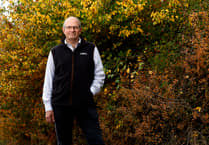Rev Jax stops traffic for silence
All those who participated in Kingsbridge’s service at the War Memorial, celebrating the VE Day anniversary, were determined not to let constant traffic noise detract from the occasion.
It was the berobed Rev Jax Tilbury who took an extra step as time for two minutes’ silence approached by walking alone into the main road, raising her arms and stopping everything on wheels. British bravery lives on! The lady deserves a medal.
Alan Goldsmith
Kingsbridge.
Labour acts while Tories stall
Yet again, after fourteen years of failed Conservative rule, a seriously botched Brexit, and a failed open borders experiment, it is down to Yvette Cooper to right yet another Tory wrong on the issue of visas and migration.
Labour has done more on this issue in ten months than the Tories did in the last ten years.
Under the Conservatives, foreign recruitment shot up whilst employment training was cut.
Yet instead of proposing credible policies, all that Kemi Badenoch and her clueless spokesman Chris Philp do nowadays is jump on bandwagon after bandwagon by proposing to introduce a migrant cap and cut the use of asylum hotels, which is something that they refused to ever implement over the last fourteen years.
This proves that whilst the Conservatives and Reform UK are all talking, this Labour government is listening to voters and clearly walking the walk.
Geoffrey Brooking
Via Email
Reed must listen on water
I just watched a video by We Own It, inviting Environment Minister Steve Reed to meet with one of his constituents at a football match, alongside campaigners, to discuss public ownership of the water industry. The current owners of Northumbrian Water, a Hong Kong-based conglomerate, reportedly had the chance to wine and dine Mr Reed to make their case at a Crystal Palace match in 2023. Ordinary constituents are asking for a similar opportunity to be heard.
Privatisation has been deliberately excluded from the Government’s water industry consultation. Why? The official line is cost, but the figures cited come from a discredited, industry-commissioned report. Mr Reed is on shaky ground here.
Since privatisation in 1989, private water firms have promised infrastructure investment. Instead, they loaded companies with debt, siphoned off billions in dividends, often to overseas investors, and failed to fix leaks or prevent sewage dumping. It’s unclear to me whether laws were broken, but the public trust certainly was.
These companies now have minimal real assets and have failed in their basic duty. Privatisation has failed! Given the scale of their failure, compensation to shareholders should be minimal. Public ownership is both fair and necessary, and refusing to discuss it is unacceptable.
We Own It represents the public interest, not corporate profit. Mr Reed, meet with them - and listen! If Labour wants to regain trust after recent local election losses, this is a vital place to start.
Dilys Morgan.
Via email
Greens win as reform rises
I would like to congratulate Jacqui Hodgson on her resounding victory in last Thursday's Devon County Council election. It just goes to show how the local electorate in Totnes and Dartington appreciate such a hardworking, honest councillor standing up for Green issues and common sense.
On the wider issue of the national rise of Reform, I would suggest the Government has three options to address this worrying trend:
- Try to win back Labour voters by being "Reform-lite" and continuing to shift to the Right. This, I would suggest, can only end in tears, as there is a sizeable progressive vote in the UK (as witnessed by Jacqui's win) currently split between Labour, Lib Dems and the Greens, which would likely be alienated by this move. This would be the least good outcome.
- Before the next General Election, get the three progressive parties to agree on running or promoting the single strongest candidate in each constituency (as happened so successfully at the last General Election when Caroline Voaden was endorsed by the South Devon Primary exercise). Although this turned out to be very successful in South Devon, it is probably unrealistic to consider a nationwide agreement given the traditional party loyalties and rivalries.
- Enact Proportional Representation to replace our antiquated First Past the Post voting system, which in Europe we share only with the dictatorship in Belarus. The outcome of the last General Election was wildly unrepresentative of the votes cast, giving Labour a huge majority far exceeding its 34% of electoral support. The splintering of the old two-party system means that First Past the Post is just not up to the job anymore and needs to go. Whilst this would almost certainly result in coalition government, as is the case across Europe, it would allow progressive parties to unite around shared values and form a coherent bloc able to address the concerns of the electorate and the undemocratic voices coming from the far Right. This would take political courage from Keir Starmer, but would effectively change the electoral landscape forever, as promised but never enacted by Tony Blair's government many years ago. This would be the best outcome, and would definitely be a case of thinking outside the box - clearly necessary when the whole shape of the box has so recently changed. So, to Keir Starmer, I would say, "Feel the fear and do it anyway."
Robert Smith
Totnes
Homes must include nature
I am writing to express my strong belief that nature and housing development must go hand in hand, and to urge the government to prioritise this principle in planning policy and practice.
As we face the twin crises of climate change and biodiversity loss, we must acknowledge the vital role that natural spaces play not just for the planet, but for people too. Green infrastructure—such as trees, wetlands, meadows, and wildlife corridors—should be considered essential components of all new housing developments, not optional add-ons.
Well-planned access to nature improves physical and mental well-being, fosters community connection, and supports children’s development. It can also mitigate flooding, improve air quality, and support native wildlife. These aren’t luxuries—they’re basic ingredients for healthy, resilient communities.
When housing is built without proper integration of green space, we don’t just lose nature—we lose opportunities to build places where people genuinely want to live, raise families, and grow older. We end up having to retrofit nature later at far greater cost, both financially and ecologically.
The government has an opportunity to lead the way in embedding nature into planning policy. This means mandating generous and meaningful green space, protecting existing ecosystems during development, and designing with long-term environmental sustainability in mind.
Please take action to ensure that new housing developments contribute not just to housing targets, but to a greener, healthier, and more hopeful future for everyone.
Yours sincerely,
Genevieve Madeira
Via Email
Biodiversity loss demands change
Living in beautiful south Devon for the last fifteen years, I have been greatly saddened by the obvious fall in biodiversity here. The variety of birds at our feeders, the number of butterflies in the meadows and insects in general have fallen dramatically, and as nature is so interconnected, all wildlife is suffering. We are responsible for the damage we have done and must take responsibility for correcting it. We implore the government to rethink its plans to let development override nature.
Yours sincerely,
Caroline Cochrane
Kingsbridge,
Dartmouth drop-in every Thursday
Dear readers,
Just a quick note to remind you that we’ll be holding a weekly drop-in clinic in Dartmouth Visitor Centre every Thursday from 10am to noon.
If you’ve got something to say, a story to share or simply want to chat, feel free to pop by. We’re always happy to hear from you.
Best wishes,
Tom Ladds
Chief Reporter





Comments
This article has no comments yet. Be the first to leave a comment.